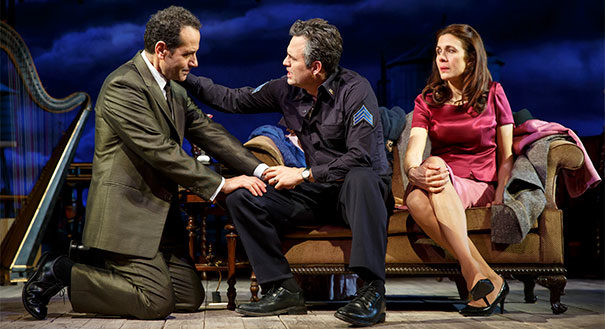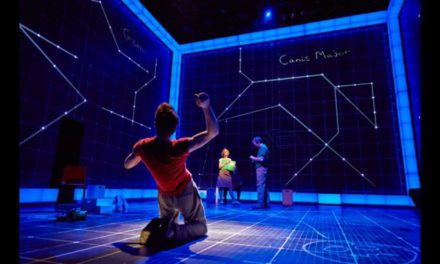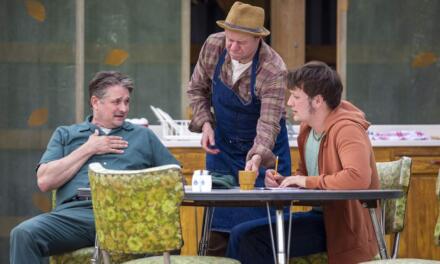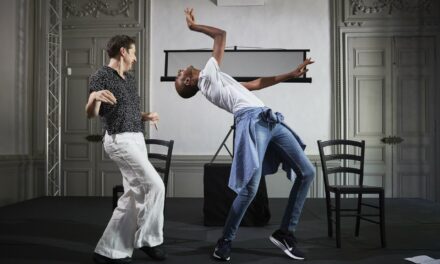In Roundabout Theatre Company’s revival of Arthur Miller’s The Price, the first striking element is the set—which emanates an otherworldly air, vast and intimate at once. A furnished room is displayed stage-level, accompanied by a looming overhead structure from which additional furniture pieces hang. Water towers line the circumference at a greater distance, extending the perceptible size of the space seemingly beyond limit. Purplish, dense, ominous clouds compose the backdrop. Some of the stage-level furniture are covered with white protective sheets: we’re confronted with someone’s estate.
First offering the chance to observe Victor Franz (Mark Ruffalo) alone in the space, the opening scene swiftly lends access to the nature of his relationship with his wife (Esther Franz, played by Jessica Hecht). Unsparing in his disapproval of her tipsiness and pointedly linking it to her spells of depression, Ester lyrically retorts “It’s the kind of depression I enjoy.” It’s worth the pause to remark that Hecht no less than fully embodies her character. She’s expertly comfortable in the range of postures (which are lanky and in a constant state of motion), with a demeanor that shifts between an air of agreeableness and one of petty despair.
Other familial insights are revealed, dealt in stacked succession like a hand of cards. Victor’s long-absent brother is resented for finishing medical school, leaving Victor to care for their then-deteriorating, now-deceased father. Wealth and power costume in several shades: judgments of materialism are countered with arguments for money’s enablement of freedom, alongside accusations of “moral debt.” Victor’s classically prideful male ego also enjoys numerous expressions, some of which Ester bitingly calls out with jabs such as “I’m stuck, but I admit it.”
With an exact gender ratio of four to one (male to female, of course), the play is self-aware of its chauvinism. When introductions are made to the furniture buyer, Gregory Solomon (here endowed with the gravitas of Danny DeVito), Esther’s name is omitted and substituted with simply “my wife.” Despite Ester’s consistent fielding of such subordinations, the fact that she is the shrewdest of the lot is far from lost on characters and audience members alike. Her established place in the power structure is used as a pawn in advancing the nuance of those dynamics. For example, Solomon praises her distrustful questioning (quipping, “I like her. She’s suspicious.”) while criticizing Victor’s distrustfulness as a hindrance to his business acumen. It’s safe to acknowledge a strong quality in a disenfranchised person, but a matter of a threat to acknowledge it in someone who has influence in deal-making.
The impassioned sincerity that Ruffalo has become known for is set loose in Act Two—and yes, is worth the price of admission. Victor’s brother (Walter Franz, played by Tony Shaloub) arrives unexpectedly, and both demonstrate considerable stamina in an increasingly complex emotional maelstrom. Layer after layer of plot-twist is excised, bringing about such admissions as Walter’s “terror was controlling my ambition.” Terror of what? Of power being turned around on him. He details his mistake in confusing the submissiveness of those he frightened with admiration.
The layers deepen and alternate. Walter’s vulnerable divulgence doesn’t even get a chance to settle; it instead segues directly into the challenging of Victor with, “Did it ever occur to you that [the father]exploited you?” At this point, the brilliance behind Derek McLane’s set design all but quakes beneath the theatre itself. The surrounding furniture stands as unspoken but now staunchly material proof of “hidden” wealth. The years Victor spent suffering and trash-diving for his supposedly depleted father were a sham, scurried about senselessly in a maze of sellable valuables.
Layer, again: Victor admits having a moment of clarity, way back when, and choosing to stay in the subterfuge in the name of pity. (How often the illusion of self-sacrifice ensnares the codependent.) The set gains still stronger gravity as we visually reckon with the characters’ choice to blindly justify resentment while staring at the relics of contradiction day in, day out. Victor’s proverbial self-paralyzation in defense of a manipulator’s lies haunts like a specter, and appreciation for Roundabout’s choice of reviving The Price at this particular political moment matures.
In an effort not to give too much away, let it be said that only a choice few angles of the play’s relevance are mentioned here. The Price is laden with parallels to modern sociological conundrums, from Solomon attempting to re-context facts as “relative,” to the recurrence of patriarchal tyrants stepping in to take advantage of others’ cycles of victimization. On a not-unrelated side-note, my walk through the theatre district on the night of the performance brought me through crowds of kids wearing Trump hats—kids!—which, needless to say, was unsettling. The enormity of what is perpetrated through conditioning, regardless of social position, began an eerie infiltration in my consciousness. Although The Price ends on its own eerie tone, its prior warnings equally reverberate: being haunted is a choice, and the struggle for power is as ancient as humanity.
First published at The Atticus Review on April 26, 2017. Reposted with permission.
Playwright: Arthur Miller
Director: Terry Kinney
On Broadway by Roundabout Theatre Company
American Airlines Theatre, New York, NY, 2017
This post was written by the author in their personal capacity.The opinions expressed in this article are the author’s own and do not reflect the view of The Theatre Times, their staff or collaborators.
This post was written by Rachel E. Diken.
The views expressed here belong to the author and do not necessarily reflect our views and opinions.


















